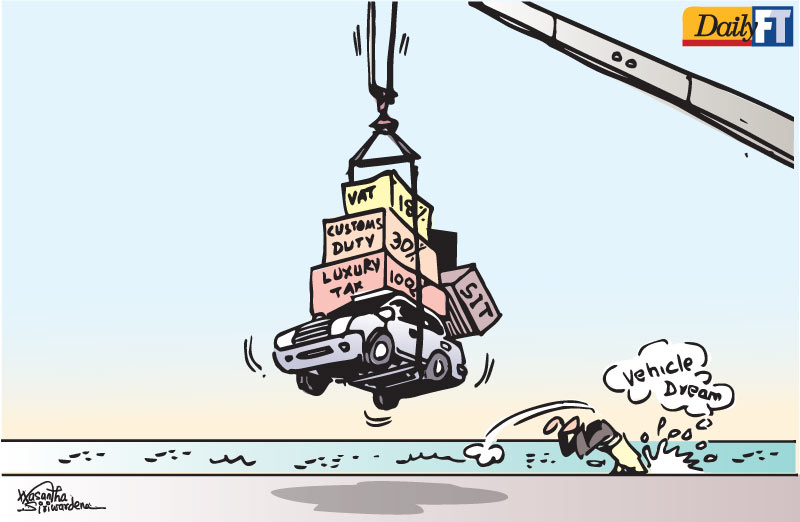Thursday Feb 19, 2026
Thursday Feb 19, 2026
Monday, 3 February 2025 04:56 - - {{hitsCtrl.values.hits}}

By Charumini de Silva
Sri Lanka’s long-awaited decision to lift its five year ban on vehicle imports has sparked mixed reactions from industry leaders, with concerns emerging over affordability, taxation policies and the broader economic impact.
Vehicle Importers’ Association Lanka (VIAL) and Vehicle Importers Association of Sri Lanka (VIASL) both welcomed the move while acknowledging the positives and negatives of the Government’s approach.
VIAL President Indika Sampath Merenchige stressed that critical revisions were needed to prevent a surge in vehicle costs.
“The newly introduced regulations could make vehicle ownership prohibitively expensive for ordinary citizens,” he told the Daily FT.
He pointed to the Government’s decision to limit imports to vehicles no older than three years, as the factor behind rising prices. “Under previous regulations, vehicles aged between five to seven years were permitted, allowing for more affordable options,” he said.
Merenchige cautioned that under the new system, an ordinary citizen would struggle to buy a vehicle for below Rs. 10 million, whereas maintaining the previous five-year limit could have kept prices between Rs. 6 million to Rs. 6.5 million.
He explained that high demand in Japanese used car auctions was already pushing up bid prices and with the restrictive import policy — the forex outflow would only increase. “Instead, the Government can introduce a $ 1.2 billion value limit on total vehicle imports, combined with a five year age limit, which would balance affordability with foreign exchange control, whilst boosting State revenue,” he suggested.
Beyond pricing, Merenchige also flagged a technical error in the HS codes related to vans and urged the Government to exempt vans from luxury tax.
VIASL President Prasad Manage, acknowledging that opening up the market after a five year hiatus was a positive move, noted that the approach came with both advantages and challenges.
He said the importers will be able to bring in the first batch of cars by the end of this month, while the cabs are expected in early March.
Noting that the luxury tax threshold had been raised from Rs. 3.5 million to Rs. 5 million for petrol and diesel jeeps and cars and Rs. 5.5 million for hybrids, he pointed out that it was a move.
However, increasing the number of tax categories involved from four to five, he pointed out that taxation complexity has increased. “Earlier, it was just Excise duty, Custom Duty, VAT and Luxury tax (which is being implemented for the first time despite being introduced in 2015 and amended in 2019 because the market was closed from 2020). Now, on top of those four taxes, including a 50% surcharge on import duties applicable for one year, would inevitably drive up the vehicle prices,” he explained.
He said this also means that the vehicle prices will vary significantly based on engine capacity, with higher duties for larger engines.
Manage also pointed to the Government’s sudden shift in considering the date of manufacture rather than the date of registration as a key concern for importers. “If the date of manufacture cannot be determined, the vehicle will be considered as two years old, potentially causing major revenue loss to the Government. Importers are now pressing for this issue to be rectified in the upcoming Budget,” he said.
Looking ahead, Manage estimated that the used vehicle market in the country would see a price drop as new imports enter the market. However, with the Government limiting total vehicle imports around $ 1 billion, he said the industry expects around 12,000 vehicles to be imported in the first month, though overall volumes will remain far below the record levels of 2018.
VIASL President also noted that while importers had requested the reinstatement of vehicle permits, the Government had prioritised revenue generation and foreign exchange control instead.
Separately, President Anura Kumara Dissanayake addressing a rally during the weekend defended the cautious approach taken by the Government.
He warned that pent-up demand for vehicles could trigger another foreign exchange crisis, insisting the need for tight forex management as the country navigates its economic recovery.